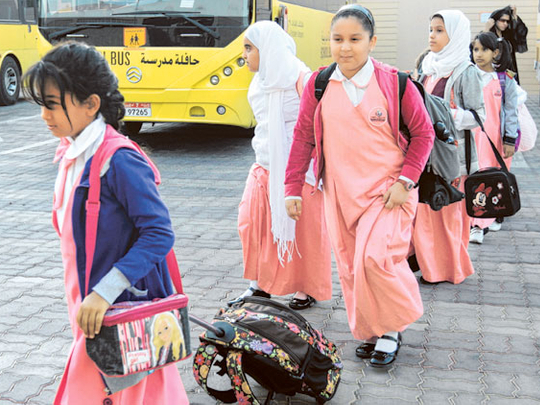
Abu Dhabi: Nearly Dh4 billion must be invested into private education to ensure that there are enough schools in the emirate of Abu Dhabi by 2020, senior education officials announced in the capital on Tuesday.
The investment must be directed at setting up about 100 schools that offer quality education for low and middle-income earning families, said Hamad Al Daheri, executive director for private schools and quality assurance at the Abu Dhabi Education Council (Adec).
“By 2020, the private sector must provide 146,000 additional seats fulfilling the educational needs for a total of about 280,000 pupils. This requires substantial investment into private education. Moreover, about 69 per cent of all private schools in the emirate already enrol more pupils than their actual capacity,” he said.
Al Daheri was speaking at the first forum organised by Adec to encourage private investment in the education sector.
At present, more than 198,000 pupils, representing 60 per cent of all schoolchildren in the emirate, are enrolled at 185 private schools. The existing private schools provide education in 15 different curricula, including American, Indian and British systems.
To ensure enough seats for pupils, 15,000 new school seats must be made available each academic year, as well as 24,000 additional places to educate pupils displaced by the closure of villa schools.
Many of these new schools must cater to middle and low-income earning families, especially as nearly 63 per cent of all pupils in private schools are currently enrolled at facilities that charge annual tuition fees less than Dh15,000.
“We need to ensure that enough private schools are set up, and that they all adhere to Adec quality standards,” Al Daheri said.
He also revealed that an Adec questionnaire had recently shown that 53 per cent of all parents consider education quality to be the most important criterion in selecting a school. Yet, 75 per cent of all current schools don’t meet Adec’s minimum standards at present.
Insufficient data about the education sector, and a lack of clarity about investment regulations, have so far held back quite a few potential investors, the official told Gulf News on the sidelines of the forum.
To bridge this, Adec will soon publish an annual report that will provide information about education demand, existing schools, pupil numbers and areas for investment, Al Daheri said.
“The report will guide investors, and should be released at the end of the 2012-2013 academic year. In addition, an electronic system to process investment licences will also be introduced within the next three months,” he added.
Officials also confirmed that provisional licences granted to investors will be withdrawn if construction of school infrastructure does not begin within the year.
“This will ensure that only capable and committed investors are selected to develop a sector that is so crucial to the well-being of families,” Dr Mugheer Al Khaili, director-general at Adec, told Gulf News.
While plots for new schools are no longer available on Abu Dhabi island, Adec is working with investors to establish schools off the mainland. Accordingly, a number of schools are set to open over the next two years. These include the Bright Riders School in Mohammad Bin Zayed City, which will offer the Indian curriculum, and Cranleigh Abu Dhabi, the capital’s first boarding school which will be located on Saadiyat Island.












